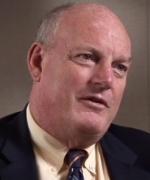
David A. Hovda, PhD is the director of the UCLA Brain Injury Research Center. He is past president of the National Neurotrauma Society and past president of the International Neurotrauma Society. He has served as chair of study sections for the National Institute for Neurological Disease and Stroke (NINDS).
Dr. Hovda has received a number of awards for his research on brain injury and recovery of function, including the 1991 National Head Injury Foundation Award, the Giannini Foundation Award, the Benjamin Franklin Haught Memorial Award, the 2008 Deborah L. Warden Lectureship Award and named the Lind Lawrence Eminent Scholar for his work on the topic of Traumatic Brain Injury. In addition, Dr. Hovda received the 2006 Women in Neurotrauma award for his teaching and support for women in neuroscience.
Dr. Hovda is most well known internationally for his translational work on the pathobiology of traumatic brain injury. He has devoted most of his career to understanding the mechanisms of recovery of function. He currently sits on several editorial boards. Dr. Hovda continues to serve as a consultant for professional sport organizations, as well as the Veteran’s Administration and Department of Defense, addressing issues related to traumatic brain injury and recovery of function. Dr. Hovda received the 2011 U.S. Army Strength of the Nation Award, which is the highest civilian award given by the U.S. Army, for helping it accomplish its mission for 2011.
Dr. Hovda received his doctoral training at the University of New Mexico under the supervision of Dr. Dennis M. Feeney. His 1985 doctoral thesis described how amphetamine administration can restore binocular depth perception after damage to the visual cortex. Dr. Hovda completed his postdoctoral training under Dr. Jaime Villablanca at the Mental Retardation Research Center at UCLA conducting research on the topic of neuroplasticity and recovery after cerebral hemispherectomy. This work resulted in several discoveries addressing how the young brain can reorganize itself in order to enhance recovery of function after it has been damaged. In 1989, Dr. Hovda was recruited by the Division of Neurosurgery to direct its scientific efforts to understand the cellular pathophysiology of brain injury. In 1990, the UCLA Brain Injury Research Center was created under Dr. Hovda and Dr. Donald Becker’s oversight incorporating teaching, research, patient care and service for the field of traumatic brain injury.
